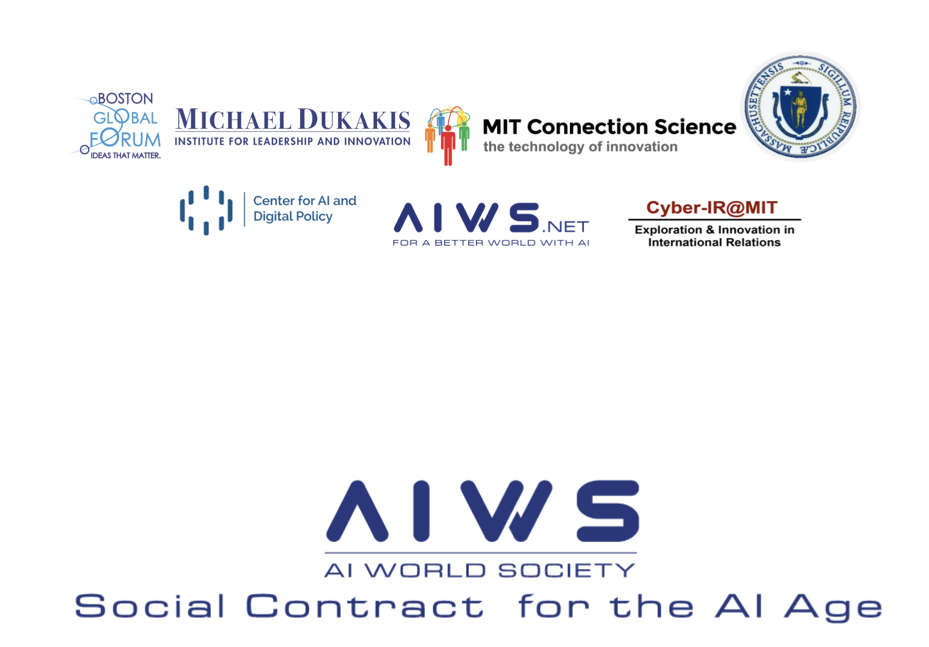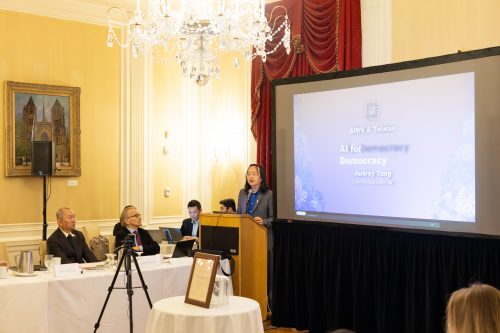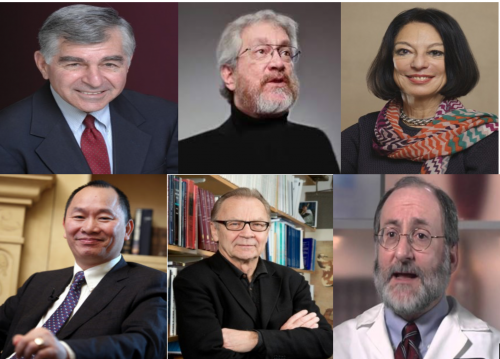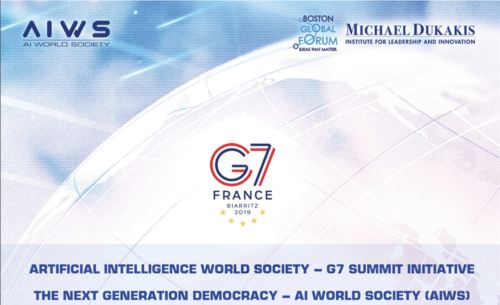
09/09/2020
Original Signatories
Governor Michael Dukakis, Boston Global Forum and
President Vaira Vīķe-Freiberga, Latvia and World Leadership Alliance-Club de Madrid
Additional Signatories
Vint Cerf, Father of Internet, Google, Nazli Choucri, MIT,
Prime Minister Zlatko Lagumdzija, Bosnia and Herzegovina,
Tuan Anh Nguyen, Boston Global Forum, Thomas Patterson, Harvard University,
Alex Pentland, MIT, Marc Rotenberg, CAIDP, David Silbersweig, Harvard University
- A New Social Contract in the Age of Artificial Intelligence
The term “artificial intelligence” refers to the development of computer systems able to perform tasks that normally require human intelligence, such as visual perception, speech recognition, decision-making, language translation, and self-driving cars. Advances in AI have already altered conventional ways of seeing the world around us. This is creating new realities for everyone – as well as new possibilities.
These advances in AI are powerful in many ways. They have created a new global ecology and yet remain opaque and need to be better understood. Advances in AI raise policy issues that must be assessed. We must now focus through dialogue, tolerance, learning and understanding on key principles and practices for an agreement among members of society for shared social benefit that we call the Social Contract for the AI Age.
The expansion of Artificial Intelligence is widely recognized and could change our lives in ways yet unimagined. At the same time, without guidelines or directives, the undisciplined use of AI poses risks to the wellbeing of individuals and creates possibilities for economic, political, social, and criminal exploitation.
The international community recognizes the challenges and opportunities, as well as the problems and perils, of AI. Many countries have announced national strategies to promote the proper use and development of AI. These strategies set out common goals such as:
- Scientific research, funding and culture,
- Sustainable development, and inclusive growth
- Skills, education, and talent development
- Public and private sector adoption,
- Fairness, transparency, and accountability
- Ethics, values and inclusion,
- Reliability, security and privacy,
- Science-policy links,
- Standards, human control and regulations
- Data and digital infrastructure.
AI is also the focus of foreign policy and international cooperation. There is a shared view that no country will be able to compete or meet the needs of its citizens without increasing its AI capacity. As well, many countries are now engaged in technology leapfrogging. It is no longer expected, nor necessary, to replicate the stages of economic development of the West—one phase at a time.
In a world as diverse as the one today, there are few mechanisms for responding to such possibilities on a global scale. Social Contract for the AI Age is designed to establish a common understanding for policy and practices, anchored in general principles to help maximise the “good” and minimise the “bad” associated with AI. Derived from the 18th century concept of a social contract—an agreement among the members of society to cooperate for social benefits—Social Contract for the AI Age is focuses on the conditions of the 21st century. It is a response to artificial intelligence, big data, the Internet of Things, and high-speed computation.
Foundations
Just as earlier social contracts helped shape societies for a common purpose, the Social Contract for the AI Age has a transformative vision, one that transcends the technological features of artificial intelligence and seeks to provide foundations for a new society. Consider, for example, how the Covid-19 pandemic urgently requires a new society with new structure and order, approach — new ways to share data and coordinate action, accelerated social reliance on digital service across businesses, education, and government services. The Social Contract for the AI Age would create standards for a new international system. It focuses on the conduct of each nation, relations with international business and not for profit entities, and the cooperation of nations. Just as TCP / IP is the platform for communication among internet users, the Social Contract for AI Age is a platform for connection among governments, stakeholders, and private and public institutions.
Objectives
The Social Contract for the AI Age seeks to build a multi-stakeholder, inclusive society in all aspects of life across politics, government, economics, business, and industry. The Social Contract for the AI Age values creation, innovation, philanthropy, and mutual respect. It seeks the right of freedom on, and access to, the Internet worldwide. The Social Contract for the AI Age seeks to make the world a locus of responsible interaction—a place where every person’s contribution is recognized and everyone has a right to knowledge and access to information, where no one is above the law, where money cannot be used to subvert political process, and where integrity, knowledge, creativity, honesty, and tolerance shape decisions and guide policy.
In short, the Social Contract for the AI Age seeks to build a world where all are recognized and valued, and all forms of governance adhere to a set of values and are accountable and transparent. It is a world where global challenges are met by collective action and responsibility.
- Principles
Extensive and appropriate AI application to politics, governments, society, and businesses can create a Smart Democracy. The Social Contract for the AI Age creates a platform for a Smart Democracy society, and a new global supply chain, named Supply Chain 2020. As a framework for society in the AI age, the Social Contract 2020 is based on balancing power among governments, businesses, civil society, individuals, and AI assistants. The Social Contract for the AI Age is a commitment to protect property, common values, and collective norms.
- AI must respect fundamental human rights such as human dignity, rule of law, and privacy protection.
- AI systems must be considered from a multi-stakeholder perspective — for the individual and for society as a whole
- The Social Contract for the AI Age is a basis to achieve sustainable and inclusive development for a global community that is fair, equitable, and prosperous. It is designed to apply the concept of a people-centered economy and to create a trustworthy AI, data, and Internet ecosystem for work and life.
- The Social Contract for the AI Age should be transparent and accountable, and follow standards based on policies driven by trustworthy data. The UN Sustainable Development Goals data metrics and the World Economic Forum Environmental, Social, and Governance (ESG) metrics, should provide citizens and organizations with reliable data that enables well-informed policy choices.
- Communities must have control over their data. Data is the basis of self-determination and provides the ability to measure the impact of actions and policy in the AI realm.
- Data literacy at all levels of society, together with open, trustworthy information, is the basis for an intelligent, thoughtful society.
- Commitments of Stakeholders/ Power Centers
- Individuals, Citizens, Groups:
- Everyone is entitled to basic rights and dignity that are enhanced/promoted by AI.
Data Rights and Responsibilities:
- Each individual has the right to privacy and is entitled to access and control over their own data. Individuals have a right to manage their data, individually or collectively, and the right to withhold their data from businesses.
- Each individual and each community must have access to a trustworthy AI, data, and Internet ecosystem to create an inclusive, fair, people-centered economy, and society.
Internet Rights:
- Each individual has the right to access the Internet and any website or news system without restriction.
- Freedom of expression on the Internet is guaranteed.
- Secure digital identity allows the individual to know about, and control access to their data.
Education and Political Participation:
Each individual has the right to education through best available venues.
- Each individual must have access to education/knowledge/training about the use and impact of AI.
- Each individual has the right to unimpeded political participation.
- Everyone must have access to due process and fair trial, as well as remediation for injustice.
Responsibility:
- Individuals is prohibited from exercising socially disruptive behaviors, such as hacking, disseminating disinformation or online hate.
- Individuals must contribute to the common good through appropriate taxes and provision of critical personal information (with appropriate data protection) as, for example, in the collection of census data and voting for public officials
(2) Governments. Governments have a leading role in the Social Contract for the AI Age.
- All government should behave responsibly in the management of AI for governance and for interactions with individuals and such behavior must be easily auditable.
- All governments implement AI governance policies that respect honesty, transparency, fairness, and accountability. These standards and norms apply in every area of governance and are the basis for collaboration with international communities.
- All governments create incentives for citizens to use AI in ways that benefit society (for example each person does good work for society that will be recognized as value, and this value can be exchanged with other values such as financial value, products, services, etc.).
- All governments construct a secure, stable, and trustworthy AI, data, and Internet ecosystem for work and life to support the people-centered economy.
- All governments ensure that communities are able take control of their data and use AI with their data so that they can manage their community to suit their needs and to create prosperity for themselves and their family.
- All governments establish norms, rules and pass laws to ensure AI benefits society.
- All governments create secure safety net for citizens in a trustworthy AI, data, and Internet ecosystem for work and life.
- All governments protect intellectual property rights without undermining free access to the information commons.
Collaborations between governments:
- Norms, values and standards of the Social Contract for the AI Age are designed as connections among governments. To maintain the Social Contract for the AI Age, it is essential for countries to establish a Democratic Alliance for Digital Governance. All governments should work to promote the Democratic Alliance for Digital Governance.
United Nations and International Organizations:
- The United Nations should extend international human rights standards for AI, and create a UN Convention on AI and establish a specialized UN Agency on AI.
- Business Entities. Business operations and related rights come with accountability and responsibility – nationally and internationally. Business must:
- Enable independent audits for transparency, fairness, accountability, and cybersecurity.
- Adopt common AI values, standards, norms, and data ownership rules with penalties for noncompliance.
- Companies will be incentivized to do business only with companies and countries that uphold the Social Contract for the AI Age and endorse Supply Chain 2020.
- Collaborate with governments and civil society to help create a people-centered AI, data, and Internet ecosystem, to create trustworthy and relevant data, and to use AI to share wealth with individuals and communities.
- Civil Society Organizations & Community. Rights and responsibilities of civil society organizations include:
- Monitor governments and firms with respect to common values.
- Promote common values, norms, standards, and laws.
- Support AI users and assist them to serve the broad interests of society.
- Collaborate with governments, business entities, and others to create a people-centered AI, data, and Internet ecosystem for work and life, enabling all people can create meaningful data, value, and create value-based wealth for their community.
- Enable data cooperatives—the voluntary collaborative pooling by individuals of their personal data for the benefit of the group or community.
- Participate in the making of AI rules and norms.
- Enhance civil society become an intelligent, thoughtful civil society based on knowledge, smart data, critical thinking and social responsibility; and through the achievement of data literacy, to become a trusted open-data system, with validated, predictive AI tools that communities to plan their future.
(5) AI Assistants. AI assistants provide an interface to facilitate compliance with established standards.
- Support AI users and assist them to serve the broad interests of society.
- Engage with other power centers for mutual support and supervision.
- Community control: AI assistants should be governed by communities of users.
- The Social Contract for the AI Age will be implemented as follows:
- The promulgation of a Code of Ethics for AI Developers and AI Users.
- The creation of a system to monitor and evaluate governments, companies, and individuals (based on their contribution to maintaining norms, standards, common values, and international laws for honesty, transparency, accountability, and responsibility).
- The recognition of the Social Contract for the AI Age by the United Nations, governments, companies, civil society and the international AI community.
- The establishment of a United Nations Convention on Artificial Intelligence to obligate governments and others to comply with international rules and norms to protect rights in AI age.
- The development of the Democratic Alliance for Digital Governance as the global authority to enforce the Social Contract for the AI Age.
- The creation of the “AIWS City”—an all-digital virtual city based on the standards and norms of “the Social Contract for the AI Age”, “People Centered Economy”, “Trustworthy Economy”, “AI-Government”, and “Intellectual Society-Thoughtful Civil Society”.
Social Contract for the AI Age is now open for signature by others HERE










